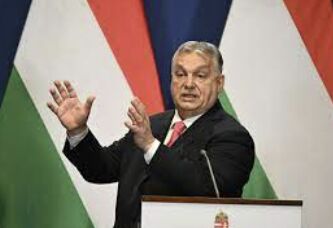Hungary Faces Pressure to Approve Sweden's NATO Bid Amidst Growing Frustration
Hungary under increasing pressure to approve Sweden's NATO bid, facing delays and criticism from Western allies. Analysts fear Prime Minister Orbán's personal attitude has damaged Hungary's relationship with its partners.
Hungary, the last member of NATO not to have given its approval for Sweden's bid to join the military alliance, is facing increasing pressure to move forward with the application. With Turkey completing its ratification of Sweden's bid, all eyes are on Hungarian Prime Minister Viktor Orbán and his conservative populist government. Despite his promises that Hungary wouldn't be the last NATO member to ratify Sweden's request, Orbán's government has faced delays and criticism from Western partners urging them to approve the application. The governing Fidesz party remains unconvinced, with lawmakers offended by alleged lies from Swedish politicians regarding Hungary's democracy.
BREAKING: President Erdogan has signed Sweden’s NATO membership and the bill has been published on the official gazette. Only deposition to DC left and eyes are turning into Hungary. 🇸🇪🇹🇷
— Henri Vanhanen (@HenriVanhanen) January 25, 2024
Orbán's critics argue that he alone is in control of Hungary's approval of Sweden's NATO membership. While Turkey made concrete demands from Sweden as preconditions for supporting its bid, Hungary has only hinted that it expects a greater degree of respect from Stockholm, without presenting any specific conditions. Opposition parties in Hungary have made several attempts to schedule a vote on Sweden's membership but have been refused support by the Fidesz party, which holds a two-thirds majority in parliament.
Orbán, in an attempt to prove his weight on the international stage, has reached out to Swedish Prime Minister Ulf Kristersson to negotiate Sweden's NATO membership, but Sweden's foreign minister sees no reason to negotiate with Hungary, noting that Budapest hasn't presented any conditions for accepting Sweden into the alliance. Analysts and opposition lawmakers believe that Orbán's personal attitude is driving the delay in Hungary's approval and worry that his conduct on the international stage has damaged Hungary's relationship with its Western partners.
The fate of Sweden's NATO bid, it seems, lies not in the hands of Hungarian lawmakers, but with Orbán himself. With a vote on Sweden's NATO accession unlikely to appear on the Hungarian parliament's agenda until late February, the frustration among Western allies wanting to expand the alliance and provide security guarantees to Sweden amid the war in Ukraine is palpable. Orbán's conduct, it seems, has put Hungary on the edge of NATO and is seen as a sin by some.




